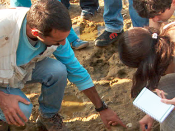Por Björn Lehnert (LBNL).
Since the Nobel prize-winning discovery of neutrino oscillation, we know that neutrinos have a non-zero mass. However, the absolute mass scale of the most abundant matter particle in the Universe remains unknown. Three fundamentally different approaches aim to determine the neutrino mass: Global fits to cosmological data, neutrinoless double beta decay, and kinematic measurements. The latter is the most direct way to determine the mass of the neutrino and is investigated with tritium beta decays in the Karlsruhe Tritium Neutrino (KATRIN) experiment.
KATRIN performs spectroscopy of beta-electrons near the tritium endpoint at 18.6 keV by employing a high intensity windowless gaseous tritium source and a highprecision electrostatic spectrometer. The required sensitivity demands novel hardware operating with unprecedented stability and a precise understanding of all systematic effects and their correlations. After 18 years of construction, KATRIN performed its first measurement campaign in 2019 and continues data taking. The first dataset was presented end of 2019. The second dataset was published last month. I will present the KATRIN setup, its challenges, and latest results.
Transmissão via Zoom.






